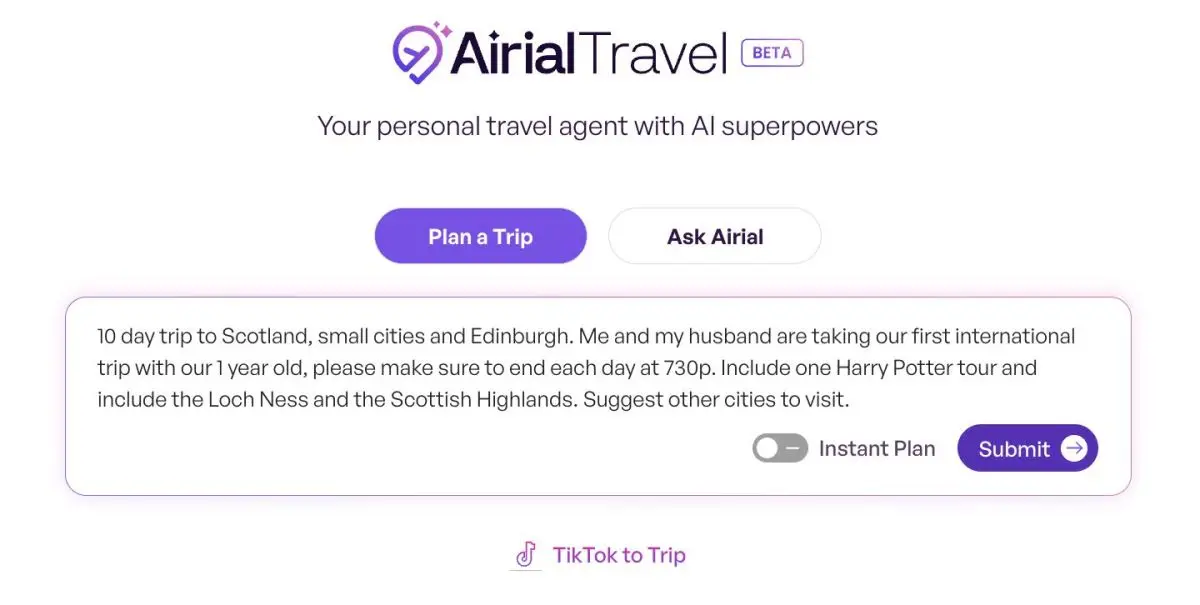Ex-Expedia Executives Launch AI-Powered Business Travel Startup
2 Sources
2 Sources
[1]
Expedia vet leads stealthy Madrona Venture Labs spinout building an AI agent for business travelers
A group of longtime travel industry veterans are teaming up on a new Seattle-based startup called Otto that is developing an AI-powered virtual assistant for business travel booking. The company on Thursday announced a $6 million seed round led by Madrona. Steve Singh, managing director at Madrona who co-founded business expense software giant Concur, is executive chairman of Otto. The 7-person startup is led by CEO Michael Gulmann, who spent nearly a decade at Expedia Group in various leadership roles, and also worked at business travel management giant Egencia. Otto is still developing its product, but Gulmann shared some details about the company's vision in an interview with GeekWire this week. The idea is to take advantage of large language models including OpenAI's GPT-4 to help business travelers quickly book flights and hotels with a conversational chatbot that learns personal preferences and can filter through options based on a user's calendar and other parameters. The virtual assistant not only scours through lodging and airfare data but also can complete payments on behalf of the user. It's built to be used both before and during a trip. Otto is targeting business travelers who book their own travel and don't pay for services provided by large corporate travel agencies, also known as Travel Management Companies (TMC). "We can provide a ton of value to those travelers," Gulmann said. It's the latest AI-booking tool using generative AI and other automation tools in an attempt to ease the logistics around travel booking. Earlier this year Expedia unveiled its own "AI-powered travel buddy" called Romie, and there's a Germany startup called Swifty using AI to book travel for business. Otto plans to offer its product for free and generate cash from a revenue-sharing model for facilitating bookings. Gulmann said there could be additional revenue opportunities down the line, such as charging users for advanced features. He said Otto will likely use humans in the loop to verify transactions. The company's bot is not able to access personal identifiable information or payment details, Gulmann said. Otto was incubated at Seattle-based Madrona Venture Labs, the startup studio associated with Madrona, and spun out earlier this year. Mike Fridgen, managing director of Madrona Venture Labs, spent time at two travel startups earlier in his career, including airfare prediction website Farecast, which was acquired by Microsoft in 2008. "With significant advancements in natural language understanding capabilities, robust travel API capabilities, and soaring consumer adoption of AI, Otto is poised to fundamentally alter the travel industry with an entirely novel experience," Fridgen wrote in a blog post. Hugh Crean, former CEO of Farecast, is an investor in Otto. Other backers include Erik Blachford, former CEO of Expedia, and Barney Harford, former CEO of Orbitz and a current board member at United Airlines. Direct Travel, a corporate travel management company acquired by Madrona and others in April, also invested in the seed round. Singh is also executive chairman at Direct Travel. Since departing Concur a few years after its $8.3 billion acquisition to SAP in 2014, Singh has taken the exec chair role at Spotnana, a travel-as-a-service technology platform; at Center, a corporate card and expense management platform; and Troop, a group meetings and events company. Otto is partnering with Spotnana to provide its AI model with real-time airfare data, and plans to leverage open platforms from Direct Travel, Center, and Troop. "We know AI will be pervasive in the value it can deliver across the travel industry -- from booking travel to predictive servicing that anticipates traveler needs based on real-time data, to personalized recommendations based on past behaviors [which of course evolve with time]," Singh wrote in a blog post. "Otto's AI capabilities are at the forefront of what's possible."
[2]
Former Expedia VP's startup uses AI to help smaller companies book travel | TechCrunch
Small businesses and startups often lack a dedicated travel desk, forcing executives and founders to rely on human assistants or consuming and cumbersome travel apps. Expedia's former VP of global product, Michael Gulmann, is betting on AI to bridge the gap. His company, Otto, is emerges from stealth Thursday, with plans to launch an alpha version of the platform to select U.S. participants in September. The service is designed to quickly facilitate flight and hotel bookings through natural language queries. Otto has raised $6 million in a seed round led by Madrona Ventures, with participation from Direct Travel. Angel investors in the round include former C-suite executives from services including Expedia, Ortbiz, Uber and Farecast. The startup will utilize $6 million it has raised into product development and hiring engineering talent. It should give Otto a run rate of two years. Gulmann told TechCrunch that while the likes of TravelPerk and Concur focus on large enterprises, Otto is looking to serve customers who lack access to the services. "Think of Otto as a high-end travel agent or executive assistant that remembers your preferences, such as your choice of hotels and flights. It will also remember other nuances such as if you prefer to stay within 10 minutes of your meeting place," Gulmann said. He noted that this means users don't have to re-enter preferences each time they use the service. They also don't have to toggle between travel sites and services like Google Maps. Gulmann added that Otto automatically looks for changes in bookings and schedules. For instance, if your preferred hotel is booked, it gives you an option for another hotel that's nearby. In instances where the 'bot can't complete the booking for some reason, it will hand over the operations to a human agent at Direct Travel, who will pick up where it left off. Gulmann explained that these cases will likely be rare, though it's difficult to gauge frequency without more real world testing. Steve Singh, Madrona's managing director and the interim CEO at travel tech firm Spotnana, led Otto's seed round. The exec, who also founded Concur, acquired Direct Travel (one of the investors in the round), with various other investors in April. Singh is the executive chairman at Direct Travel and will assume a similar position on Otto's board. Speaking with TechCrunch, Singh said he believes Otto has a great opportunity to capture some market in the travel space. "The reason behind a large set of business travel being unmanaged is that services like Concur or other travel management companies are too expensive for small businesses. Typically small business owners take help of executive assistants for travel. That's what's good about Otto, it acts as your own executive assistant or a travel agent," he said. Otto is using its network of investors and advisors to get the best flight and travel data -- integrating with services like Direct Travel and Spotnana -- to facilitate customized booking queries. Gulmann said that, for instance, if you need a hotel with a rooftop bar, you won't find that as a filter on Expedia or Booking.com. He said that Otto is leveraging various hotel data providers and airline schedule databases to provide better customization for users. The company is currently fine tuning off-the-shelf AI models using their own data. Gulmann noted that the cost of using these models will be far lower than what the company will earn from affiliate revenue per booking. Otto plans to let the bot book transactions, anonymize trip IDs, and analyze data to check for hallucinations or errors. It emphasized that because it uses different agents and models for different tasks, number of hallucinations should be small. Gulmann said that with alpha release, the company plans to hone its product, aiming to open it up to more people through a beta release by the end of the year. He plans to make Otto more widely available in early-2025. Singh adds that, in future, Otto will be able provide a highly personalized service. Users would be able to say as little as "Book me a trip for my next week's meeting" and the tool will plan a trip based on historical data and preferences.
Share
Share
Copy Link
Former Expedia executives are developing an AI-powered platform to revolutionize business travel. The startup, backed by Madrona Venture Labs, aims to streamline travel planning and management for corporate travelers.

Former Expedia Executives Venture into AI-Powered Business Travel
A new startup, led by ex-Expedia executives, is making waves in the business travel industry with its innovative AI-powered platform. The company, which remains in stealth mode, has emerged from Madrona Venture Labs and is poised to transform the way corporate travelers plan and manage their trips
1
.Leadership and Backing
The startup is helmed by Aman Bhutani, former president of Brand Expedia Group, who brings extensive experience in the travel technology sector. Bhutani is joined by other ex-Expedia executives, leveraging their collective expertise to address the complexities of business travel
2
.Madrona Venture Labs, known for incubating and launching successful startups, is backing this new venture. The support from such a reputable investor signals strong confidence in the startup's potential to disrupt the business travel market
1
.AI-Powered Travel Agent
At the heart of the startup's offering is an AI-powered travel agent designed specifically for business travelers. This virtual agent aims to simplify the often complicated process of planning and booking business trips, potentially saving time and reducing stress for corporate travelers
2
.The AI agent is expected to handle various aspects of travel management, including flight and hotel bookings, itinerary planning, and potentially even expense management. By leveraging artificial intelligence, the platform could offer personalized recommendations and efficient solutions tailored to individual traveler preferences and company policies
1
.Related Stories
Market Opportunity and Challenges
The business travel market presents a significant opportunity, with global spending expected to reach $1.8 trillion by 2027, according to the Global Business Travel Association
2
. However, the sector also faces challenges, including the need for cost-effective solutions and the increasing demand for personalized travel experiences.The startup's AI-driven approach could address these challenges by offering more efficient and tailored travel planning services. By automating and optimizing various aspects of business travel, the platform has the potential to reduce costs for companies while improving the overall experience for travelers
1
2
.Industry Impact and Future Prospects
As the startup continues to develop its AI-powered travel agent, industry observers are keenly watching its progress. The combination of experienced leadership from Expedia, backing from Madrona Venture Labs, and innovative AI technology positions the company as a potential game-changer in the business travel sector
2
.While details about the startup's specific features and launch timeline remain under wraps, the anticipation surrounding its development highlights the growing interest in AI-driven solutions for travel management. As the business travel industry recovers and evolves post-pandemic, such innovative approaches could play a crucial role in shaping its future
1
2
.References
Summarized by
Navi
[1]
Related Stories
Recent Highlights
1
ByteDance's Seedance 2.0 AI video generator triggers copyright infringement battle with Hollywood
Policy and Regulation

2
Microsoft AI chief predicts artificial intelligence will automate most white-collar jobs in 18 months
Business and Economy

3
Anthropic and Pentagon clash over AI safeguards as $200 million contract hangs in balance
Policy and Regulation








